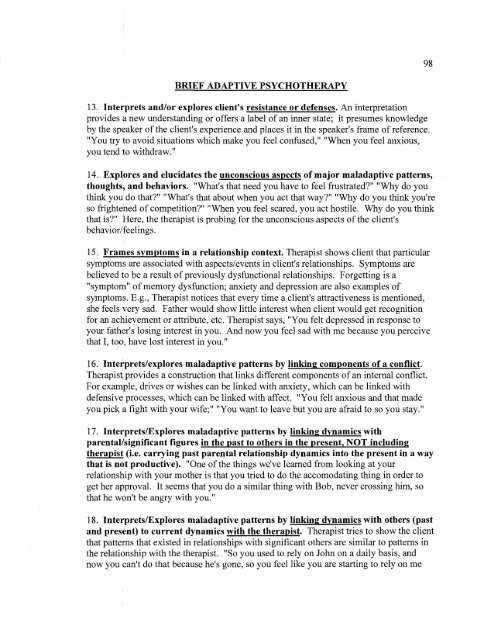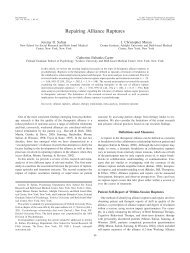Download - The Safran Lab
Download - The Safran Lab
Download - The Safran Lab
Create successful ePaper yourself
Turn your PDF publications into a flip-book with our unique Google optimized e-Paper software.
BRIEF ADAPTIVE PSYCHOTHERAPY<br />
13. Interprets and/or explores client's resistance or defenses. An interpretation<br />
provides a new understanding or offers a label of an inner state; it presumes knowledge<br />
by the speaker of the client's experience and places it in the speaker's frame of reference.<br />
"You try to avoid situations which make you feel confused," "When you feel anxious,<br />
you tend to withdraw."<br />
14. Explores and elucidates the unconscious aspects of major maladaptive patterns,<br />
thoughts, and behaviors. "What's that need you have to feel frustrated?" "Why do you<br />
think you do that?" "What's that about when you act that way?" "Why do you think you're<br />
so frightened of competition?" "When you feel scared, you act hostile. Why do you think<br />
that is?" Here, the therapist is probing for the unconscious aspects of the client's<br />
behavior/feelings.<br />
15. Frames symptoms in a relationship context. <strong>The</strong>rapist shows client that particular<br />
symptoms are associated with aspects/events in client's relationships. Symptoms are<br />
believed to be a result of previously dysfunctional relationships. Forgetting is a<br />
"symptom" of memory dysfunction; anxiety and depression are also examples of<br />
symptoms. E.g., <strong>The</strong>rapist notices that every time a client's attractiveness is mentioned,<br />
she feels very sad. Father would show little interest when client would get recognition<br />
for an achievement or attribute, etc. <strong>The</strong>rapist says, "You felt depressed in response to<br />
your father's losing interest in you. And now you feel sad with me because you perceive<br />
that I, too, have lost interest in you."<br />
16. Interprets/explores maladaptive patterns by linking components of a conflict.<br />
<strong>The</strong>rapist provides a construction that links different components of an internal conflict.<br />
For example, drives or wishes can be linked with anxiety, which can be linked with<br />
defensive processes, which can be linked with affect. "You felt anxious and that made<br />
you pick a fight with your wife;" "You want to leave but you are afraid to so you stay."<br />
17. Interprets/Explores maladaptive patterns by linking dynamics with<br />
parental/significant figures in the past to others in the present, NOT including<br />
therapist (i.e. carrying past parental relationship dynamics into the present in a way<br />
that is not productive). "One of the things we've learned from looking at your<br />
relationship with your mother is that you tried to do the accomodating thing in order to<br />
get her approval. It seems that you do a similar thing with Bob, never crossing him, so<br />
that he won't be angry with you."<br />
18. Interprets/Explores maladaptive patterns by linking dynamics with others (past<br />
and present) to current dynamics with the therapist. <strong>The</strong>rapist tries to show the client<br />
that patterns that existed in relationships with significant others are similar to patterns in<br />
the relationship with the therapist. "So you used to rely on John on a daily basis, and<br />
now you can't do that because he's gone, so you feel like you are starting to rely on me<br />
98



